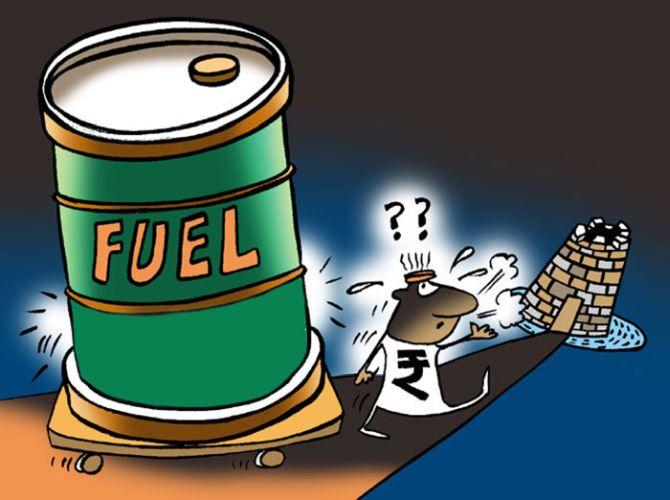Inflation in food articles, fuel and power contracted in July.
Illustration: Uttam Ghosh/Rediff.com

Wholesale price-based inflation declined for the third consecutive month to a 25-month low of 1.08 per cent in July, mainly on account of subdued prices of food items, fuel and manufactured products, government data showed on Wednesday.
The wholesale price index (WPI)-based inflation was at 2.02 per cent in June this year and 5.27 per cent in July 2018.
The previous low for WPI inflation was 0.9 per cent in June 2017.
The consumer price index (CPI)-based retail inflation, which the Reserve Bank of India (RBI) takes into account while deciding its monetary policy, eased marginally to 3.15 per cent for July, indicating room for further rate cut in monetary policy in October.
Although the RBI does not take into account the WPI while deciding its monetary policy, steep decline in wholesale inflation rate to 1.08 per cent will strengthen the case for a further rate cut in the next policy decision in October.
The inflation in food articles -- with over 15 per cent weightage in WPI basket -- stood at 6.15 per cent in July, as against 6.98 per cent in the previous month, data released by the commerce ministry showed.
Amongst food articles, potato prices continued to slide during July at (-)23.63 per cent as against (-) 24.27 per cent a month earlier and vegetable prices eased with an inflation print of 10.67 per cent (from 24.76 per cent).
However, prices of fruits moved up by 15.38 per cent during the month as against a meagre inflation print of 1.87 per cent in June this year.
Likewise, wholesale inflation in fuel and power segment (contributing 13.15 per cent) contracted further to (-) 3.64 per cent as against (-) 2.2 per cent in June.
For non-food articles, the wholesale rate of price rise stood at 4.29 per cent, slightly lower than 5.06 per cent a month earlier.
Inflation in manufactured products -- with weightage of 64.23 per cent -- eased marginally to 0.34 per cent from 0.94 per cent, as per the government data.
WPI inflation is expected to remain muted in the near term, reflecting the continued softness in commodity prices, although a weaker currency may arrest the correction in price of imports, said Aditi Nayar, principal economist of ICRA.
The fall in the core-WPI inflation contrasted with the uptick in core CPI inflation in July 2019, led by the different composition of these two indices.
Around half of the core-CPI is made up of services, the demand for which is likely to be sticky in a downturn and prices relatively inelastic to changes in commodity prices, she added.
"Moreover, available trends suggest that the fall in wholesale food inflation in July 2019 may prove to be temporary. Additionally, the rise in gold prices would push up inflation related to other manufacturing," Nayar said.
Rahul Gupta, currency research head, Emkay Global Financial Services said the drop in WPI was unexpected, it is largely due to a fall in food inflation.
"The drop in retail and wholesale inflation clearly states that the 110 bps rate cut transmission is still not observed, keeping a room open for one more rate cut in the future.
"If not a rate cut then RBI may force banks to reduce their MCLR in order to revive consumer demand," he said.